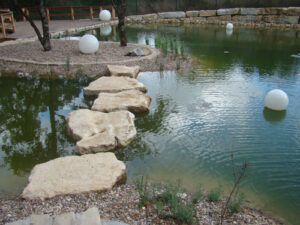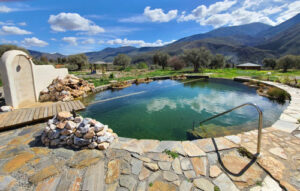 BIO-POOLS
BIO-POOLS
Bio-pools or biological pools are defined by the biological purification of water (*1), using only mechanical and biological means.
In them, the existing processes of nature are copied. Biological swimming pools are therefore one of the so-called nature-based solutions (*2) required by the IUCN (https://www.iucn.org/resources/grey-literature/towards-nature-based-solutions-mediterranean) and the EU for a more sustainable world.
In biological pools, potential pathogenic organisms are eliminated by their natural predators, and their self-reproduction in the environment is prevented by oxygen-rich and nutrient-poor water. The water is therefore alive and healthy.
Biological swimming pools thus achieve healthy water through bio-purification, as opposed to disinfection which is achieved with life-killing techniques and chemicals.
 "Natural swimming pools", "naturalized swimming pools", "ecological swimming pools", "bathing lake", "swimming lake", "eco-pool"... All these terms are used interchangeably for bathing water created by biological water purification. Also some of these terms have traditionally been used for bathing areas in the sea, lake or river ("natural swimming pool"). However, some companies use these names for ponds/pools that appear to be natural but use aggressive forms of disinfection that kill life and therefore do not correspond to the principles of a biological or natural pool. -See: "ecological pools" or hybrid pools (*3).
"Natural swimming pools", "naturalized swimming pools", "ecological swimming pools", "bathing lake", "swimming lake", "eco-pool"... All these terms are used interchangeably for bathing water created by biological water purification. Also some of these terms have traditionally been used for bathing areas in the sea, lake or river ("natural swimming pool"). However, some companies use these names for ponds/pools that appear to be natural but use aggressive forms of disinfection that kill life and therefore do not correspond to the principles of a biological or natural pool. -See: "ecological pools" or hybrid pools (*3).
In order to define good practice in the design and construction of biological pools, the IOB has drawn up a list of basic essential principles. Common essentials (*4.)
 Currently in Spain, biological swimming pools for public use are not authorized due to a lack of adequate legislation. Therefore the Iberian group developed the GIABN Guidelines (*5) in line with the IOB technical standards based on the experience of the main European countries with a long tradition of natural public swimming pools.
Currently in Spain, biological swimming pools for public use are not authorized due to a lack of adequate legislation. Therefore the Iberian group developed the GIABN Guidelines (*5) in line with the IOB technical standards based on the experience of the main European countries with a long tradition of natural public swimming pools.
From the late 1980s to the present day, hundreds of public swimming pools have been built in Europe. In Germany alone there are more than 400 of them, many of them with a capacity of hundreds of people per day. Biological swimming pools in the world. International situation (*6)
